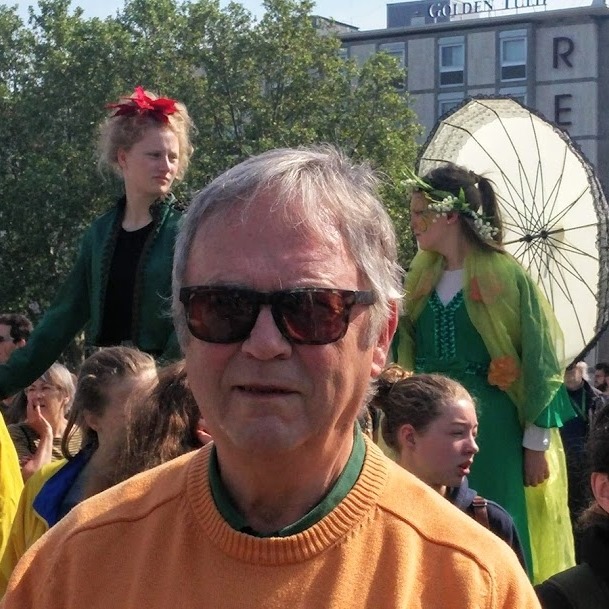Now, when President Truman dropped atomic bombs on Hiroshima and Nagasaki in 1945, the Spanish Jesuit Pedro Arrupe (1907-1991; ordained a priest in 1936) was serving in Japan as a missionary. Later, Father Arrupe served as the superior general of the Society of Jesus (known informally as the Jesuit order from 1965 to 1983.
For further reading about Father Arrupe's life and times, see Pedro Miguel Lamet's 2020 book Pedro Arrupe: Witness of the Twentieth Century, Prophet of the Twenty-First, translated by Joseph V. Owens, S.J. (Institute of Jesuit Sources; original work published in 2019). Disclosure: I was in the Jesuits from 1979 to 1987.
Now, despite the totally terrifying threat of atomic warfare that all Americans lived under in postwar America, a funny new thing emerged in postwar America, as the University of Virginia's Grace Elizabeth Hale explains in her 2010 book A Nation of Outsiders: How the White Middle Class Fell in Love with Rebellion in Postwar America (Oxford University Press). According to Hale, the trend of white middle-class rebellion emerged in postwar America before the 1960s.
The American Jesuit Renaissance specialist and cultural historian and pioneering media ecology theorist Walter J. Ong (1912-2003; Ph.D. in English, Harvard University, 1955) discerned and discussed this trend in his title essay "The Barbarian Within: Outsiders Inside Society Today" in his 1962 book The Barbarian Within: And Other Fugitive Essays and Studies (Macmillan, pp. 260-285).
Ong's 1962 title essay is reprinted in An Ong Reader: Challenges for Further Inquiry, edited by Thomas J. Farrell and Paul A. Soukup (Hampton Press, 2002, pp. 277-300).
In any event, Ong and John F. Kennedy (1917-1963) in the 1960s were part of an older generation - as were my parents.
But if Hale and Ong are correct in suggesting that this trend of rebellion in favor of outsiders had emerged in the white middle class of Americans in postwar America before the 1960s, then perhaps some of the rebellion in the 1960s in American culture, perhaps even including the election of President Kennedy in 1960, should be seen as manifestations of that cultural trend.
However that may be, the 1960s were characterized by certain forms of rebellion.
Even so, in Ong's terminology in his 1962 title essay, the Harvard-educated John F. Kennedy for the most part represented what Ong refers to as the Greek position - not what Ong refers to as the barbarian position. Nevertheless, President Kennedy did come around to supporting the black civil rights movements spearheaded in the early 1960s by the Reverend Dr. Martin Luther King, Jr. - representing what Ong refers to in his 1962 title essay as the barbarian position.
Now, we do not know for sure just how impressionable young Joe Biden and young Donald Trump were in the 1960s, nor do we know for sure exactly what impressions they had of the 1960s.
But we do know that the Baby Boomers grew up with television sets. Of course, we do not know how many Baby Boomers watched the televised debates between the two leading presidential candidates in 1960, Senator Kennedy of Massachusetts and Vice President Richard M. Nixon.
But we do know that John Kennedy was telegenic -- and photogenic - and that young Jack Kennedy had been a hero in the Navy during World War II. In the 1960s, he and his wife Jacqueline Kennedy were so telegenic and photogenic that they seemed almost like they had been cast by Hollywood to play their parts on the world stage. In any event, the media lionized Jack and Jackie Kennedy, as they were known at the time. In short, they were glamorous - and the aura of glamor associated with them made the early 1960s also seem somehow to be glamorous to me as a teenager at the time.
But at the time, most Republicans such as Senator Barry Goldwater of Arizona, generally did not find the Kennedy presidency to be attractive.
For further reading about President Kennedy and his assassination - most likely by the CIA - see the following three books:
(1) James W. Douglas, JFK and the Unspeakable: Why He Died and Why It Matters (Orbis Books, 2008);
(2) Peter Janney, Mary's Mosaic: The CIA Conspiracy to Murder John F. Kennedy, Mary Pinchot Meyer, and Their Vision for World Peace (Skyhorse Publishing, 2012);
Next Page 1 | 2 | 3 | 4 | 5 | 6 | 7 | 8 | 9
(Note: You can view every article as one long page if you sign up as an Advocate Member, or higher).





